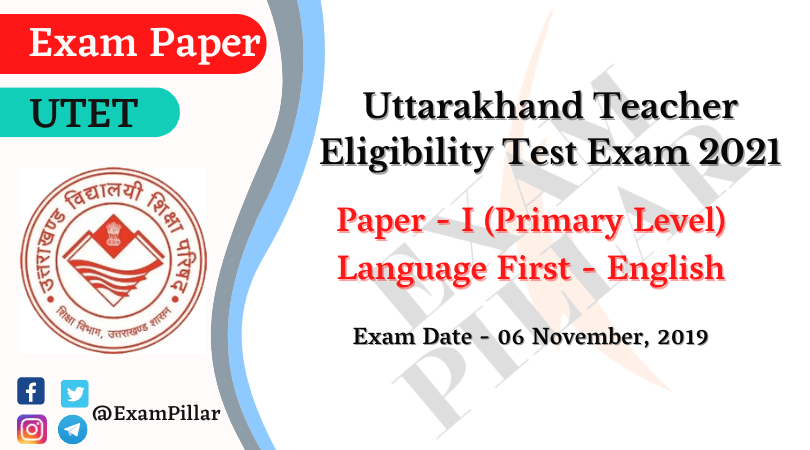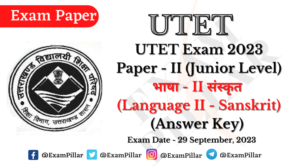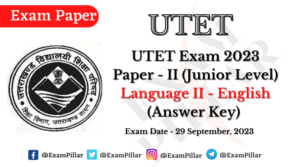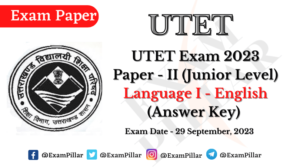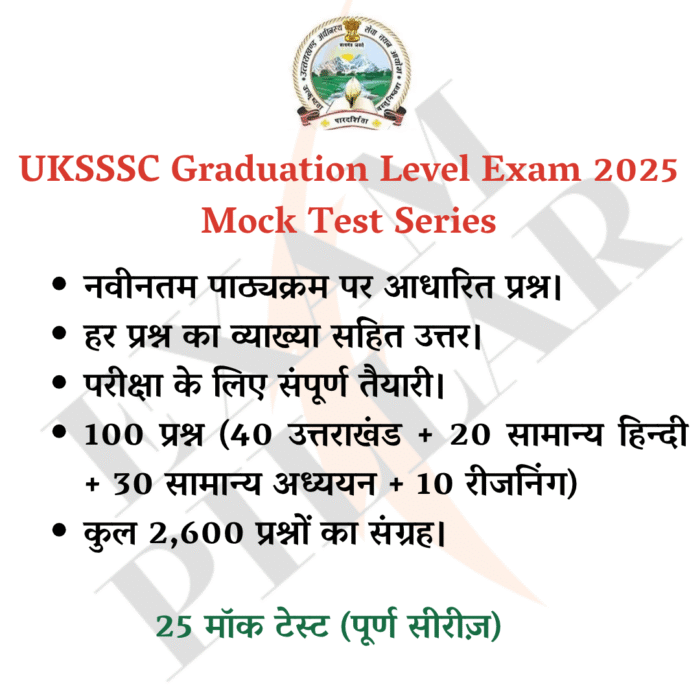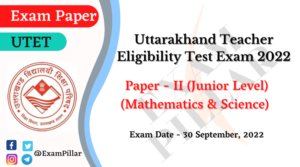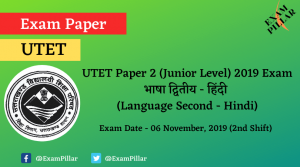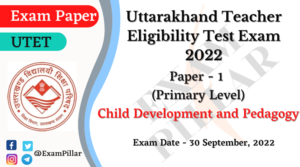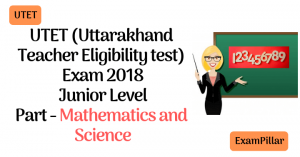उत्तराखंड विद्यालयी शिक्षा परिषद् (UBSE – Uttarakhand Board of School Education) द्वारा 06 नवम्बर 2019 को UTET (Uttarakhand Teachers Eligibility Test) की परीक्षा का आयोजन किया गया। UTET (Uttarakhand Teachers Eligibility Test) Exam Paper 2019 –भाषा प्रथम – अंग्रेजी की उत्तरकुंजी (Language First – English Part Answer Key).
UBSE (Uttarakhand Board of School Education) Conduct the UTET (Uttarakhand Teachers Eligibility Test) 2019 Exam on 06 November 2019. Here UTET Paper 1 Language First – English Subject Paper with Answer Key.
UTET (Uttarakhand Teachers Eligibility Test) Primary Level
(Class 1 to Class 5)
Exam :− UTET (Uttarakhand Teachers Eligibility Test)
Part :− भाषा प्रथम – अंग्रेजी (Language First – English)
Organized by :− UBSE
Number of Question :− 30
Exam Date :– 06th November 2019
Read Also …..
| UTET Primary Level Paper | Link |
| UTET Exam 2019 – Paper – 1 (Child Development and Pedagogy) | Click Here |
| UTET Exam 2019 – Paper – 1 (Language – I : Hindi) | Click Here |
| UTET Exam 2019 – Paper – 1 (Language – II : Hindi) | Click Here |
| UTET Exam 2019 – Paper – 1 (Language – I : English) | Click Here |
| UTET Exam 2019 – Paper – 1 (Language – II : English) | Click Here |
| UTET Exam 2019 – Paper – 1 (Language – II : Sanskrit) | Click Here |
| UTET Exam 2019 – Paper – 1 (Mathematics) | Click Here |
| UTET Exam 2019 – Paper – 1 (Environmental Studies) | Click Here |
UTET Exam 2019 Paper – 1 (Primary Level) Answer Key
Part – (Language First – English)
Direction (Q. No. 31 – 32): Complete the sentences by filling in the blanks, choosing one of the given alternatives.
31. Gita was known to be a ______, so nobody entrusted any important work to her.
(A) joker
(B) worker
(C) shocker
(D) shirker
Show Answer/Hide
32. The police sprayed tear gas ______ on the protestors.
(A) indirectly
(B) intensively
(C) indifferently
(D) indiscriminately
Show Answer/Hide
Direction (Q. No. 33 to 36): Read the given passage carefully and answer the questions that follow by selecting the most appropriate options.
Long ago men spent most of their time looking for food. They ate anything they could find. Some lived mostly on plants. They ate the fruits, stems and leaves of some plants and the roots of others. When food was scarce, they ate the bark of trees. If they were lucky, they would find a bird’s nest with eggs. People who lived near the water ate fish or anything that washed ashore, even rotten whales. Some people also ate insects and small animals like lizards that were easy to kill.
Later, men learned to make weapons. With weapons, they could kill larger animals for meat. These early people had big appetike. If they killed an animal, they would drink the blood, eat the meat and chew on the bones. When they finished the meal, there was nothing left.
At first, men wandered from place to place to find food. But when they began to grow plants, they stayed in one place and ate what they could grow. They tamed animals, trained them to work, and killed them for meat. Life was a little better then, but there was still not much variety in their meals. Day after day, people ate the same food.
Gradually men began to travel greater distances. The explores who sailed unknown seas found new lands. And in these lands they found new food and spices and took them back home.
33. What did men eat if there was shortage of food?
(A) Rotten whales
(B) Bark of trees
(C) The root of trees
(D) A bird’s nest with eggs
Show Answer/Hide
34. If men trained animals, they made the animals ______ for them.
(A) race
(B) search
(C) work
(D) hunt
Show Answer/Hide
35. The phrase ‘live on’ in the passage means
(A) to eat a certain kind of food in order to survive.
(B) to eat greedily.
(C) to eat anything that you are given to eat.
(D) to depend on plants and foods for a livelihood.
Show Answer/Hide
36. At first men wandered from place to place to find food. Then some of them began to stay in one place. Why?
(A) because they began to grow plants and ate what they could grow.
(B) because they tamed animals and killed them for meat.
(C) because they trained wild animals and killed them for meat.
(D) because they began to grow plants and fruits and ate what they could grow.
Show Answer/Hide
Direction (Q. No. 37 – 38): Find out the part that has an error in the sentence given below. If the sentence is free from error, your answer is (D).
37.
A. If I was you /
B. I wouldn’t accept /
C. this project /
D. No error
Show Answer/Hide
38.
A. The Director along with his assistants /
B. have thoroughly examined /
C. the new proposal /
D. No error
Show Answer/Hide
Direction (Q. No. 39) : Choose the word nearest in meaning to the underlined words in the sentence.
39. He is a very hard working man
(A) Diligent
(B) Desirous
(C) Ridiculous
(D) Dominant
Show Answer/Hide
Direction (Q. No. 40) : Choose the word opposite in meaning to the underlined word in the sentence.
40. His behaviour with people was always friendly.
(A) charming
(B) hostile
(C) courteous
(D) sincere
Show Answer/Hide
Direction (Q. No. 41) : Fill in the blanks with the correct options to make the sentence clear.
41. A book is essentially not a talked thing, but a written thing; and written not with a view of mere ______ but of ______ .
(A) communication, permanence
(B) enjoyment, fulfillment
(C) transportation, continuance
(D) delight, abandonment
Show Answer/Hide
Direction (Q. No. 42 to 45): Read the poem given below and answer the questions by selecting the most appropriate options.
“Will no one tell me what she sings?
Perhaps the plaintive numbers flow
For old, unhappy, far off things,
And battles long ago:
Or is it some more humble lay,
Familiar matter of today?
Some natural sorrow, loss or pain,
That has been, and may be again?
What’er the theme the maiden sang,
As if her song could have no ending:
I saw her singing at her work,
And o’er the sickle bending;
I listened motionless and still;
And as I mounted up the hill;
The music in my heart I bore,
Long after it was heard no more.”
42. ‘Plaintive’ here means
(A) mournful
(B) joyful
(C) longing
(D) languishing
Show Answer/Hide
43. ‘Humble lay’ means
(A) Serious words
(B) Simple song
(C) Exuberant thought
(D) Joyful melody
Show Answer/Hide
44. ‘The music in my heart I bore’ means:
(A) I carried the memory of the song
(B) My heart was heavy with sadness
(C) My heart was full of deep feelings
(D) The music gave me great joy
Show Answer/Hide
45. ‘Familiar matters of today’ means
(A) current news
(B) simple events of day to day
(C) important matters
(D) known incidents
Show Answer/Hide

